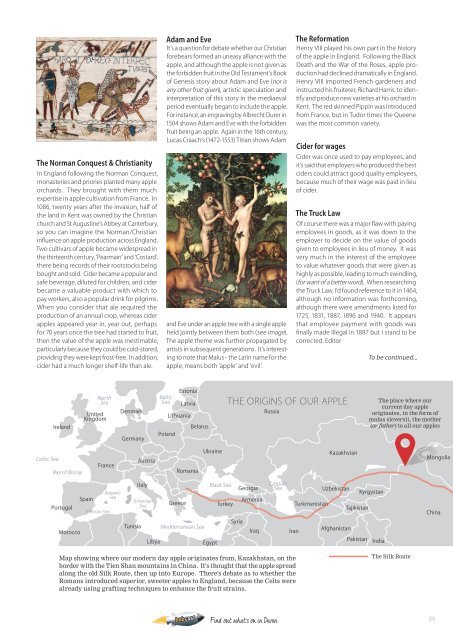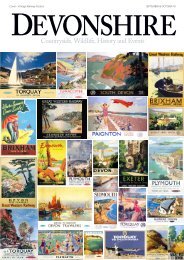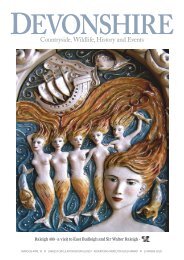Devonshire Oct to Dec 17
Devon's countryside, wildlife, history and events
Devon's countryside, wildlife, history and events
You also want an ePaper? Increase the reach of your titles
YUMPU automatically turns print PDFs into web optimized ePapers that Google loves.
The Norman Conquest & Christianity<br />
In England following the Norman Conquest,<br />
monasteries and priories planted many apple<br />
orchards. They brought with them much<br />
expertise in apple cultivation from France. In<br />
1086, twenty years after the invasion, half of<br />
the land in Kent was owned by the Christian<br />
church and St Augustine’s Abbey at Canterbury,<br />
so you can imagine the Norman/Christian<br />
influence on apple production across England.<br />
Two cultivars of apple became widespread in<br />
the thirteenth century, ʻPearmain’ and ʻCostard’,<br />
there being records of their roots<strong>to</strong>cks being<br />
bought and sold. Cider became a popular and<br />
safe beverage, diluted for children, and cider<br />
became a valuable product with which <strong>to</strong><br />
pay workers, also a popular drink for pilgrims.<br />
When you consider that ale required the<br />
production of an annual crop, whereas cider<br />
apples appeared year in, year out, perhaps<br />
for 70 years once the tree had started <strong>to</strong> fruit,<br />
then the value of the apple was inestimable,<br />
particularly because they could be cold-s<strong>to</strong>red,<br />
providing they were kept frost-free. In addition,<br />
cider had a much longer shelf-life than ale.<br />
GARDENING<br />
Adam and Eve<br />
It’s a question for debate whether our Christian<br />
forebears formed an uneasy alliance with the<br />
apple, and although the apple is not given as<br />
the forbidden fruit in the Old Testament’s Book<br />
of Genesis s<strong>to</strong>ry about Adam and Eve (nor is<br />
any other fruit given), artistic speculation and<br />
interpretation of this s<strong>to</strong>ry in the mediaeval<br />
period eventually began <strong>to</strong> include the apple.<br />
For instance, an engraving by Albrecht Durer in<br />
1504 shows Adam and Eve with the forbidden<br />
fruit being an apple. Again in the 16th century,<br />
Lucas Craach’s (1472-1553) Titian shows Adam<br />
and Eve under an apple tree with a single apple<br />
held jointly between them both (see image).<br />
The apple theme was further propagated by<br />
artists in subsequent generations. It’s interesting<br />
<strong>to</strong> note that Malus - the Latin name for the<br />
apple, means both ʻapple’ and ʻevil’.<br />
The Reformation<br />
Henry VIII played his own part in the his<strong>to</strong>ry<br />
of the apple in England. Following the Black<br />
Death and the War of the Roses, apple production<br />
had declined dramatically in England.<br />
Henry VIII imported French gardeners and<br />
instructed his fruiterer, Richard Harris, <strong>to</strong> identify<br />
and produce new varieties at his orchard in<br />
Kent. The red skinned Pippin was introduced<br />
from France, but in Tudor times the Queene<br />
was the most common variety.<br />
Cider for wages<br />
Cider was once used <strong>to</strong> pay employees, and<br />
it’s said that employers who produced the best<br />
ciders could attract good quality employees,<br />
because much of their wage was paid in lieu<br />
of cider.<br />
The Truck Law<br />
Of course there was a major flaw with paying<br />
employees in goods, as it was down <strong>to</strong> the<br />
employer <strong>to</strong> decide on the value of goods<br />
given <strong>to</strong> employees in lieu of money. It was<br />
very much in the interest of the employee<br />
<strong>to</strong> value whatever goods that were given as<br />
highly as possible, leading <strong>to</strong> much swindling,<br />
(for want of a better word). When researching<br />
the Truck Law, I'd found reference <strong>to</strong> it in 1464,<br />
although no information was forthcoming,<br />
although there were amendments listed for<br />
<strong>17</strong>25, 1831, 1887, 1896 and 1940. It appears<br />
that employee payment with goods was<br />
finally made illegal in 1887 but I stand <strong>to</strong> be<br />
corrected. Edi<strong>to</strong>r<br />
To be continued...<br />
Ireland<br />
North<br />
Sea<br />
United<br />
Kingdom<br />
Denmark<br />
Germany<br />
Baltic<br />
Sea<br />
Poland<br />
Es<strong>to</strong>nia<br />
Latvia<br />
Lithuania<br />
Belarus<br />
THE ORIGINS OF OUR APPLE<br />
Russia<br />
The place where our<br />
current day apple<br />
originates, in the form of<br />
malus sieversii, the mother<br />
(or father) <strong>to</strong> all our apples<br />
Celtic Sea<br />
Bay of Biscay<br />
France<br />
Austria<br />
Romania<br />
Ukraine<br />
Kazakhstan<br />
Mongolia<br />
Portugal<br />
Morocco<br />
Spain<br />
Alboran Sea<br />
Balearic<br />
Sea<br />
Tunisia<br />
Italy<br />
Tyrhenian<br />
Sea<br />
Greece<br />
Mediterranean Sea<br />
Black Sea<br />
Turkey<br />
Syria<br />
Georgia<br />
Armenia<br />
Iraq<br />
Caspian<br />
Sea<br />
Libya<br />
Pakistan<br />
Egypt India<br />
Iran<br />
Turkmenistan<br />
Uzbekistan<br />
Afghanistan<br />
Tajikistan<br />
Kyrgystan<br />
China<br />
Map showing where our modern day apple originates from, Kazakhstan, on the<br />
border with the Tien Shan mountains in China. It's thought that the apple spread<br />
along the old Silk Route, then up in<strong>to</strong> Europe. There's debate as <strong>to</strong> whether the<br />
Romans introduced superior, sweeter apples <strong>to</strong> England, because the Celts were<br />
already using grafting techniques <strong>to</strong> enhance the fruit strains.<br />
The Silk Route<br />
hubcast<br />
.co.u k<br />
Find out what’s on in Devon<br />
89

















